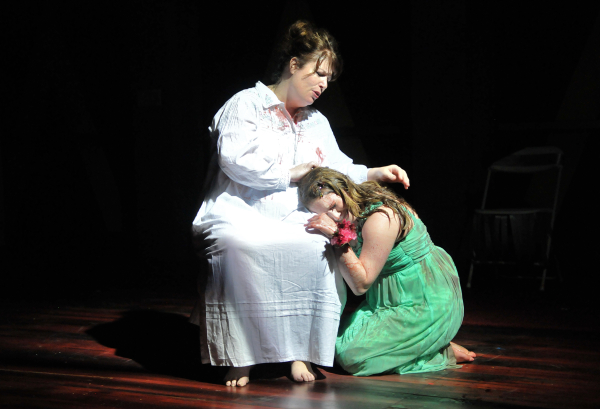Carrie

(© Craig Bailey/Perspective Photo)
Director Paul Melone has progressed from Bloody Bloody Andrew Jackson, for which he won a 2013 Elliot Norton Award, to bloody, bloody Carrie White. Oops, did I say progressed? Michael Friedman and Alex Timbers' 2008 frontier circus turned our seventh President into a rock star. Michael Gore, Dean Pitchford, and Lawrence D. Cohen's 2012 revamp of their infamous 1988 Broadway gore-fest musical Carrie turns Stephen King's 1974 novel of teen cruelty and burgeoning telekinetic powers into a poor relation of Footloose (for which Pitchford wrote the 1984 screenplay and supplied lyrics for the 1998 Broadway musical).
This tame and relatively tasteful excursion through the bullied title character's menstrual crisis, prom-night plasma bath, and brief but ballistic revenge will probably disappoint fans of the novel and the 1976 Brian De Palma film as it is neither scary nor explosive. Also out of luck are aficionados of camp lured by the lurid excesses of the original 1988 musical — a blink on Broadway but a legend in the history of expensive flops. SpeakEasy Stage Company, which is presenting the Boston premiere, adds some interesting projections to the limited special effects and brings some tough-teen attitude to the opening number, "In." And Kerry Dowling, though perhaps too tender as Carrie's religious fanatic of a mother, Margaret, brings an operatic fury to her Old Testament-fueled numbers — the best and only frightening things in the show. But for the most part, this incarnation of Carrie is short on horror and characterization, long on the banality of adolescent evil and remorse.
Since most audience members will know the story, it's probably not disastrous that the plot's only roughed in. Carrie's awareness of her powers of destruction pops out of nowhere — though there is a nice bit where she slams shut some windows from across the room. The bigger problem is Gore and Pitchford's score. Except for the vocal fire and brimstone conjured by Dowling's Margaret, the songs are generic pop with hokey lyrics. "I am a song of endless wonder that no one will claim," warbles Carrie. And "I have nothing left to lose/I have power I can use." Sue Snell, the one of Carrie's tormentors who develops a conscience, and boyfriend Tommy Ross, whom she persuades to escort Carrie to the prom, share a duet, "You Shine," that's so cloying I could feel cavities forming.
But the fault lies not in SpeakEasy or in its stars. Eric Levenson's set pieces are ingenious if laborious to push around. And the projection design by Seághan McKay provides enough flash, flame, and fragmentation to at least suggest the devastation that follows Carrie's surprise bloodbath. Emily Woods Hogue supplies the bright, era-inclusive costumes. (The production appears to be set in the present, but some of the duds look a little 1960s/'70s retro.) And musical director Nicholas James Connell leads the capable, unseen six-person band.
Nor do their two-dimensional characters defeat the cast. New York Times critic Frank Rich noted in his review of the 1988 production that most of Carrie's classmates looked old enough to be guidance counselors. That is not the case here: SpeakEasy deploys a number of Boston Conservatory students and recent grads to man the high school halls (and what can only be described as a chamber prom, with three couples and two chaperones). In the title role, rising BC junior Elizabeth Erardi, whether slumping in her Amish school dress or blossoming in her dorky prom gown with matching headdress, exudes an almost beatific sweetness that, as she discovers her capacities, develops just a glimmer of smugness. And she's quite a belter, almost holding her own against Dowling's formidable Margaret. Sue Snell, who narrates the piece in some sort of interrogation-room flashback, is pretty insufferable, repeatedly asking, "what does it cost to be kind?" But Sarah Drake lends her a pretty voice and winsome presence. And Paige Berkovitz, in pink heels and jacket piping, and a punked-out Phil Tayler, bring full-scale, full-throated meanness to bad seeds Chris Hargenson and Billy Nolan. But Carrie just isn't cut out for this combination of minimalism and schmaltz.











